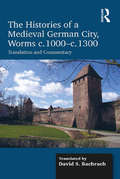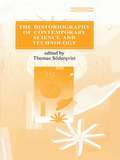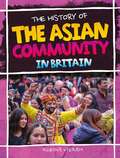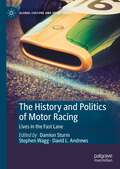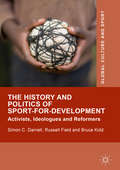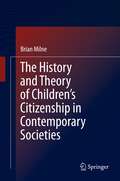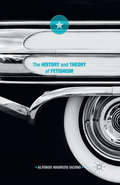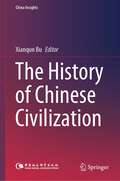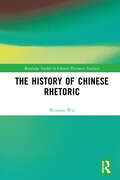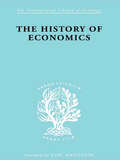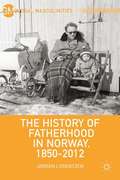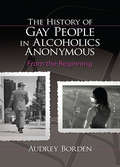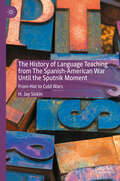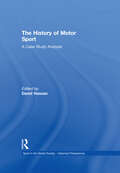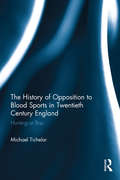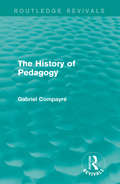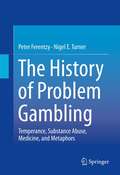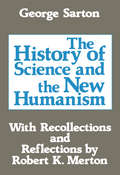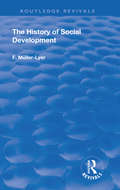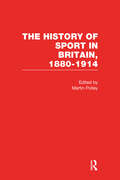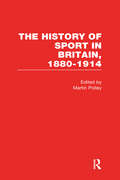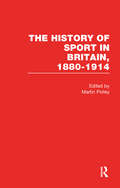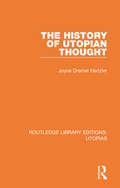- Table View
- List View
The Histories of a Medieval German City, Worms c. 1000-c. 1300: Translation and Commentary
by David S. BachrachGermany was the most powerful kingdom in the medieval West from the mid-tenth to the mid-thirteenth century. However, its history remains largely unknown outside of the German-speaking regions of modern Europe. Until recently, almost all of the sources for medieval Germany were available only in the original Latin or in German translations, while most scholarly investigation has been in German. The limited English-language scholarship has focused on royal politics and the aristocracy. Even today, English-speaking students will find very little about the lower social orders, or Germany’s urban centers that came to play an increasingly important role in the social, economic, political, religious, and military life of the German kingdom after the turn of the millennium. The translation of the four texts in this volume is intended to help fill these lacunae. They focus on the city of Worms in the period c.1000 to c.1300. From them readers can follow developments in this city over a period of almost three centuries from the perspective of writers who lived there, gaining insights about the lives of both rich and poor, Christian and Jew. No other city in Germany provides a similar opportunity for comparison of changes over time. As important, Worms was an ’early adopter’ of new political, economic, institutional, and military traditions, which would later become normative for cities throughout the German kingdom. Worms was one of the first cities to develop as a center of episcopal power; it was also one of the first to develop an independent urban government, and was precocious in emerging as a de facto city-state in the mid-thirteenth century. These political developments, with their concomitant social, economic, and military consequences, would define urban life throughout the German kingdom. In sum, the history of Worms as told in the narrative sources in this volume can be understood as illuminating the broader urban history of the German kingdom at the heigh
The Historiography of Contemporary Science and Technology (Routledge Studies in the History of Science, Technology and Medicine)
by Thomas SöderqvistMore than ninety percent of all scientific history has been made during the last half century. So far, however, only a fraction of historical scholarship has dealt with this period. Merely a decade ago, most scientific historians considered recent science - the scientific culture created, lived and remembered by contemporary scientists - an area of study best left to the historical actors themselves.
The History Of The Asian Community In Britain (The History Of #2)
by Rozina VisramDiscover the fascinating history of the Asian community in Britain, from the first settlers to the 21st Century.Newly updated, The History of the Asian Community in Britain explores why people came to Britain, the problems they faced and the contributions these communities have made to British society. Brought to life with case studies and rarely published photographs, this is an opportunity to get up close to the experiences and vital impact Asian people have had in Britain. Meet pioneers such as Sake Dean Mahomed and Jayaben Desai and find out why the Asian community has been fundamental to Britain's success on the world stage.
The History and Politics of Motor Racing: Lives in the Fast Lane (Global Culture and Sport Series)
by David L. Andrews Stephen Wagg Damion SturmThis book explores the history and politics of motor racing, one of the most popular and lucrative elements in the international sport industry. Written by a group of international scholars and motor racing specialists it discusses the sport’s origins, the relationship of motor racing to nation building and modernity (noting its links to fascism and dictatorship), the links between motor racing and the automobile industry, motor racing and the politics both of gender and of race, motor racing, the media and postmodernity, and motor racing, the spatial and globalization. This book speaks to scholars in history, politics, sport studies, the sociology of sport, sport management and cultural studies, along with the many lay readers who are interested in the relationship between motor sport and society.
The History and Politics of Sport-for-Development: Activists, Ideologues and Reformers (Global Culture and Sport Series)
by Bruce Kidd Russell Field Simon C. DarnellThis book focuses on the major social and political forces that have shaped the ways in which sport has been understood, organized, and contested in an effort to engender social change. Integrating the history of international development with the history of modern sport, the authors examine the underpinnings of sport-for-development from the mid-19th through the early 21st centuries. Including both archival research and extensive interviews with more than 15 individuals who were central to the institutions and movements that shaped sport as a force for development, this book will be of particular interest to the growing number of scholars, students, practitioners, advocates and activists interested in the possibilities and limitations of sport-for-development.
The History and Theory of Children’s Citizenship in Contemporary Societies
by Brian MilneThis book examines the notion of children having full citizenship. It does so historically, through intellectual discourse, beliefs, and moral and ideological positions on children. It looks at the status and extent of knowledge of the position of children covering about 2500 years. The book takes European and other cultures, traditions and beliefs into consideration. It reflects on the topic from a variety of disciplines, including social sciences, theology and philosophy. The book places children's citizenship in the centre of children's rights discourse. Part of the work is a critical appraisal of 'children's participation' because it diverts attention away from children as members of society toward being a separable group. The book moves on from child participation using a children's rights based argument toward examination of the relationship of the child with the state, i.e. as potentially full member citizens.
The History and Theory of Fetishism (Marx, Engels, and Marxisms)
by Alfonso Maurizio IaconoThe History and Theory of Fetishism, the expanded version of Iacono's enduring classic Teorie del feticismo and available for the first time in English, aims to provide the historical context necessary to understanding the concept of "fetishism" and offers an overview of the ideologies, prejudices, and critical senses that shaped the Western observer's view of otherness and of his own world. Iacono examines the moment when the Western observer turned his colonizing and evangelizing gaze to continents such as Africa and the Americas, while attempting to simultaneously destabilize and look at his own world critically.
The History of "Zero Tolerance" in American Public Schooling
by Judith KafkaThrough a case study of the Los Angeles city school district from the 1950s through the 1970s, Judith Kafka explores the intersection of race, politics, and the bureaucratic organization of schooling. Kafka argues that control over discipline became increasingly centralized in the second half of the twentieth century in response to pressures exerted by teachers, parents, students, principals, and local politicians - often at different historical moments, and for different purposes. Kafka demonstrates that the racial inequities produced by today's school discipline policies were not inevitable, nor are they immutable.
The History of Chinese Civilization (China Insights)
by Xianqun BuThis book tracks the entire history of Chinese civilization from a broad historical view. Its narrative spans a long period between primitive society and contemporary civilization, which makes it a unique academic works.From an academic point of view, this book is accurate in history and combines historical theories. Although brief, it captures the main thrust of the development of Chinese civilization and achieves a broad outline. Important figures, historical events, and achievements of civilization in all times are involved and discussed.From a theoretical point of view, based on the characteristics of early Chinese civilization, the book discusses the connotation of key concepts such as "civilization" and "Chinese civilization", which have certain theoretical value.From a contemporary and practical perspective, the book helps readers understand the history of Chinese civilization and promotes cultural exchanges between China and the world and leads to a better understanding of today’s China.
The History of Chinese Rhetoric (Routledge Studies in Chinese Discourse Analysis)
by Weixiao WeiThis book challenges the existing misconception that there was no rhetoric in ancient China. Instead, this book provides ample evidence from public speeches in the Xia dynasty and oracle bone inscriptions in the Shang dynasty to public debates about government policies in the Han dynasty to show that persuasive discourse and rudimentary rhetorical techniques already existed in ancient China. Using literary analysis and discourse analysis methods, this book explains how the Mandate of Heaven was inscribed at the core of Chinese rhetoric and has guided Chinese thoughts and expressions for centuries. This book also demonstrates Chinese rhetorical wisdom by extracting many concepts and terms related to language expression, persuasive speech, morality and virtue, life and philosophy, and so on from great Chinese literary works. Well-known names, such as Confucius, Laozi, Sima Qian, Liu Xie, Mozi, Hanfeizi, Guibuzi and so on, are all touched upon with their famous theory and sayings related to and explicated from the rhetorical perspective. Many surprising facts are found by the author and revealed in the book. For example, a thousand years ago, the Chinese author Liu Xie already found that all words have preferred lexical neighbors and structural environment. This is later on ‘discovered’ by corpus linguistics and illustrated, for example, by the concepts of collocation and pattern grammar. This book targets postgraduate students, teachers, researchers and scholars interested in advanced Chinese language and Chinese literature, history, and culture.
The History of Economics (International Library of Sociology)
by Werner StarkFirst Published in 1998. Routledge is an imprint of Taylor & Francis, an informa company.
The History of Fatherhood in Norway, 1850–2012 (Global Masculinities)
by Jørgen LorentzenThe first study of its kind, this book traces 150 years of the history of fatherhood in Scandinavia and shows how Scandinavian gender equality policy has important implications for the rest of the world. Among other interesting findings, Lorentzen reveals that the modern-day rise in equality fathering can be traced back to the 19th century.
The History of Forgetting: Los Angeles and the Erasure of Memory
by Norman M. KleinIn this extraordinary and original work, Norman Klein examines the process of memory erasure in LA.
The History of Gay People in Alcoholics Anonymous: From the Beginning
by Audrey BordenThe History of Gay People in Alcoholics Anonymous documents and honors the ways thousands of LGBT people have carried Alcoholics Anonymous' message. This illuminating chronicle includes interviews and documents that detail the compelling history, recovery, and wisdom of gay people in AA. The book examines the challenges AA faced as the fellowship endeavored to become a more inclusive and cohesive community. The first-person accounts narrate the important work of influential gay and straight AA members that led key events in AA’s history. The author includes material on the steps and traditions of AA, and on becoming an ally to LGBT people on the road to recovery.Topics in The History of Gay People in Alcoholics Anonymous include: the gay origins of AA’s Third Tradition a comparison of treatments for alcoholism and homosexuality compelling portraits of sober gay life in the 1950s and 1960s the debate in AA over meetings for gay alcoholics interviews with members and co-founders of the first gay AA meetings the history of the first gay AA/Al-Anon conference interviews with pioneering gay addiction professionals the history of AA pamphlet “AA and the Gay/Lesbian Alcoholic” Alcoholics Together, and why a parallel AA organization for gay alcoholics formed in southern California strategies AA’s gay members developed to make their meetings simultaneously safe and public—and why some of them are still necessary today much more The History of Gay People in Alcoholics Anonymous is an enlightening book for members of the LGBT and heterosexual recovering community, alcoholism and addiction professionals, as well as physicians, counselors, psychiatrists, psychologists, social workers, clergy, historians, sociologists, educators, students, and anyone interested in learning more about AA or this aspect of the community’s history.
The History of Language Teaching from The Spanish-American War Until the Sputnik Moment: From Hot to Cold Wars
by H. Jay SiskinThis book highlights the lively exchanges that shaped foreign-language pedagogy and educational policy during the first fifty years of the twentieth century. It is critically important to revivify our past, particularly in a field where innovation is conceptualized as progress and where knowledge production is a criterion for success. Modern language teaching began its ascendancy shortly before the turn of the twentieth century. In the academy, this impulse was marked by the founding of the Modern Language Association in 1883. Modern languages were increasingly recognized as possessing the mental and humanistic values that had formerly been the sole province of Greek and Latin. The book provides an overview of the historical, political, and social concerns that preoccupied the nation from 1898 and provides a context for analyzing the developments in the teaching of foreign languages over the course of the following century.
The History of Motor Sport: A Case Study Analysis (Sport in the Global Society - Historical Perspectives)
by David HassanFirst published in 2012. This book examines the evolution of motor sport from its creation in central Europe, throughout the rest of the continent and elsewhere, including in both North and South America. It was published as a special issue of the International Journal of the History of Sport.
The History of Opposition to Blood Sports in Twentieth Century England: Hunting at Bay
by Michael TichelarAn interdisciplinary social history, this book examines the major pressures and influences that brought about the remarkable growth of opposition to hunting in twentieth century England. With public opinion consistently deciding from the middle of the century onward that hunting mammals for sport was cruel and unacceptable, it would appear that the controversy over hunting has all but been decided, though hunting yet remains ‘at bay’. Based on a range of cultural, social, literary and political sources drawn from a variety of academic disciplines, including history, sociology, geography, psychology and anthropology, The History of Opposition to Blood Sports in Twentieth Century England accounts for the change in our relationship with animals that occurred in the course of the twentieth century, shedding light on the manner in which this resulted in the growth in opposition to hunting and other blood sports. With evidence comprising a mixture of primary and secondary historical sources, together with documentary films, opinion polls, Mass Observation records, political party archives, and the findings of sociologists, political scientists, anthropologists and geographers, this book will appeal to scholars and students across the social sciences and historians with an interest in human–animal relations.
The History of Pedagogy (Routledge Revivals)
by Gabriel CompayréPayne’s translation of Compayré’s The History of Pedagogy was initially published in 1886 due to a general lack of historical texts on education in the late nineteenth century. Compayré provides a thorough account of the doctrines and methods used by educators throughout history from educators of antiquity to the early nineteenth century. This text focusses on key thinkers and teachers such as Locke, Luther and Kant as well as considering the educational methods of the Greeks and the Romans. This title will be of interest to students of Education and Philosophy.
The History of Problem Gambling
by Nigel E. Turner Peter FerentzyThis book documents the history of ideas about problem gambling and its link to addictive disorders. The book uses a combination of literature review and conceptual and linguistic analysis to explore the way ideas about problem gambling gave changed over time. It examines the religious, socio-cultural, and medical influences on the development of the concept of problem gambling as a disease, along with the ways in which such ideas were influenced by attitudes about substance abuse. The history of mental illness, notably as it pertains to themes such as loss of control over behavior, is also addressed. The book ends with a discussion of the current status and future prospects, with an eye to which ideas about problem gambling and addictions seem most promising and which should perhaps be left behind.
The History of Science and the New Humanism
by Michael NovakIn this classic work, the foremost historian of science in our time, George Sarton, sums up his reflections on the role of science and of the humanities in our culture. Voicing his opposition to the old-fashioned humanists on the one hand, and to the 'uneducated' men of science and technicians on the other, Sarton points out to the former that the humanities without scientific are essentially incomplete. He warns the latter that without history, without philosophy, without arts and letters, without a living religion, human life on this planet would cease to be worthwhile.After outlining his 'Faith of a Humanist' in the opening section, Sarton goes on to analyze 'The History of Science and the History of Civilization,' to discuss the progress of scientific thought since ancient times in 'East and West,' and to propose the solution for the educational and cultural crisis of our time in 'The New Humanism' and in 'The History of Science and the Problems of Today.' He concludes not only that science is a source of technological development that has changed the face of the earth and has convulsed our lives for good and evil, but that it nonetheless affords the best means of understanding the world, its people, and the multitude of their relationships. 'Science is the conscience of mankind.'Included in this edition is Robert M. Merton's address before the Sarton Centennial meeting of November 1984. It is a stunning tour de force in its own right, providing insights into Sarton, teaching and research at Harvard in the 1930s, and the personal interaction between Sarton the mentor, and Merton the pupil. The essay supplements May Sarton's earlier 'Informal Portrait of George Sarton.'
The History of Social Development (Routledge Revivals)
by F. Dr. Muller-LyerFirst published in 1920, this translation of Dr. Muller-Lyer’s famous book will appeal to all who are interested in labour problems at the time. It contains a series of studies of the different economic phenomena of the day, describing the gradual evolution of each from the earliest times, with an indication of the probable trend of future developments. The inter-connection of the different conditions so described is well illustrated, and each chapter ends with a brief summary of its subject matter. The accounts of the various stages of food production, of clothing, of housing and of the use of tools contain in a brief and readable form the results of the investigations of the past century.
The History of Sport in Britain 1880-1914 V1
by Martin PolleyFirst published in 2004. This five-volume major work is a comprehensive collection of primary sources which examine changing attitudes to sport in the late Victorian and Edwardian eras. At the beginning of the period few sports were regulated, but by the outbreak of the First World War organized sport had become an integral part of British cultural, social and economic life. Martin Polley has collected articles from a wide range of journals including Blackwood's Magazine, Nineteenth Century, Fortnightly Review and Contemporary Review, which reveal changing middle-class attitudes to sport. The five volumes cover the varieties of sport being promoted, sport and education, commercial and financial aspects of sport, sport and animals and the globalization of sport through empire. Volume I includes the Varieties of Sport.
The History of Sport in Britain 1880-1914 V2
by Martin PolleyFirst published in 2004. This five-volume major work is a comprehensive collection of primary sources which examine changing attitudes to sport in the late Victorian and Edwardian eras. At the beginning of the period few sports were regulated, but by the outbreak of the First World War organized sport had become an integral part of British cultural, social and economic life. Martin Polley has collected articles from a wide range of journals including Blackwood's Magazine, Nineteenth Century, Fortnightly Review and Contemporary Review, which reveal changing middle-class attitudes to sport. The five volumes cover the varieties of sport being promoted, sport and education, commercial and financial aspects of sport, sport and animals and the globalization of sport through empire. Volume 2 includes sport, education and improvement.
The History of Sport in Britain 1880-1914 V4
by Martin PolleyFirst published in 2004. This five-volume major work is a comprehensive collection of primary sources which examine changing attitudes to sport in the late Victorian and Edwardian eras. At the beginning of the period few sports were regulated, but by the outbreak of the First World War organized sport had become an integral part of British cultural, social and economic life. Martin Polley has collected articles from a wide range of journals including Blackwood's Magazine, Nineteenth Century, Fortnightly Review and Contemporary Review, which reveal changing middle-class attitudes to sport. The five volumes cover the varieties of sport being promoted, sport and education, commercial and financial aspects of sport, sport and animals and the globalization of sport through empire. Volume 4 includes sport money- looking at the areas of professionalism and amateurism, as well as gambling.
The History of Utopian Thought (Routledge Library Editions: Utopias)
by Joyce Oramel HertzlerThis book, originally published in 1923, embodies two related and yet distinct types of sociological endeavour. It is a study in the history of social thought, a field which had only been receiving serious and widespread attention in recent years, and attempts to give an historical cross-section of representative Utopian thought at the time. But it is also a study in social idealism, a study in the origin, selection and potency of those social ideas and ideals that occasional and usually exceptional men conceive, with particular emphasis upon their relation to social progress. It was the first book that attempted to give an unprejudiced, systematic treatment of the social Utopias as a whole.
